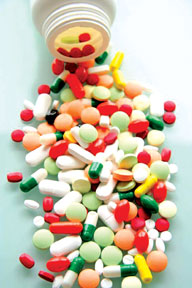|
Call for speedy implementation :
National Medicinal Drug Policy to save billions of rupees
By Lalin FERNANDOPULLE
Sri Lanka imports around 9,000 varieties of medicin when it needs
only around 350 essential drugs, said a top official of the People’s
Movement for the Rights of Patients (PMRP) during a meeting in Colombo
on Tuesday.
He said the country spends billions of rupees to import costly drugs
from multinational pharmaceutical companies who thrive on poor patients.
“The implementation of the National Medicinal Drug Policy (NMDP) will
help save the huge drain of foreign exchange that could be used for
development”, he said.
 Approximately 9,000 varieties of medicinal drugs are being registered
in the country while the World Health Organisation (WHO) has listed only
352 essential medicines for the country. Approximately 9,000 varieties of medicinal drugs are being registered
in the country while the World Health Organisation (WHO) has listed only
352 essential medicines for the country.
According to the Health Ministry only 340 varieties of drugs are
needed.
An activist and a pioneer of the Movement, Prof. Carlo Fonseka said
that it is the right of the patient to request for generic medicines
from the doctor or pharmacist and added that if doctors turn down the
request it would be tantamount to a breach of the rights of patients.
Access to medicines
According to the WHO around two billion people, that is one-third of
the global population do not have regular access to essential medicines.
A report states that developing countries spend around 50 percent of the
health expenditure on inappropriate prescribing, dispensing and sale of
medicines.
The PMRP has been lobbying for the speedy implementation of the NMDP
- a concept mooted by Prof. Senaka Bibile whose ambition was to see that
patients have access to quality medicines at affordable prices.
Prior to the 1970s Sri Lanka did not have a coordinated policy with
regard to the importation and use of medicines.
Realising the need for a coherent and stringent regulatory mechanism
Prof. Bibile advocated a government controlled pharmaceutical control
plan.
Although the Health Ministry of successive governments had promised
to implement the NMDP to date no genuine attempt has been made to get it
off the ground.
The present Health Minister had said on several occasions that the
NMDP will be implemented soon but his efforts are being sabotaged by
certain officials who fear that various problems would occur in the
health sector if the NMDP is implemented.
The PMRP filed a fundamental rights petition in the Supreme Court in
2009 to expedite the legislative process for the enactment of the NMDP.
The draft of the NMDP is currently before the Supreme Court.
Drug mafia
Vice President, PMRP, Vincent Bulathsinghala said that the drug mafia
has spread its tentacles all over the globe and the poor patient has to
pay a huge price for costly branded medicines that flood the pharmacies
around the world.
According to the Chinese proverb “Cheap things no good and good
things no cheap” but with brands and generic medicines the efficacy is
the same though generic medicines are cheaper.
The common conception among people is that the NMDP has been in the
pipeline for years pledged by successive governments but to date no
concrete action has been taken to implement the vital legislation for
the health sector in the country.
The NMDP was due for completion and implementation before the end of
2010 according to Health Ministry information.
The objectives of NMDP are to ensure the availability and
affordability of efficacious, safe and quality medicines in a
sustainable and equitable manner, to promote rational use and
distribution of drugs and local manufacture of essential medicines.
President, PMRP, Louis Benedict said that the media has a major role
to play in creating awareness on the need for a national medicinal drug
policy that would save enormous amounts of money and prevent
exploitation.
The UPFA government pledged to set up the NMDP in 2005.
Consultations were held in the same year with stakeholders and the
draft for the NMDP was prepared.
At a meeting in February with stakeholders the former Health Minister
assured that the NMDP will be implemented in a few weeks. Popular
pressure for the implementation of the NMDP grew in 2007.
In October 2007 the Cabinet approved a memorandum submitted by former
Minister of Health Nimal Siripala De Silva to set up a National
Medicinal Drug Authority and granted approval to draft a new Act to
expedite the implementation of NMDP by amending the Cosmetic Devices and
Drugs Act where necessary.
NMDP provides the guidelines on importation, manufacture,
registration, distribution and advertising on drugs in Sri Lanka.
It also aims at addressing the issue of the shortage of drugs in the
country.
|

